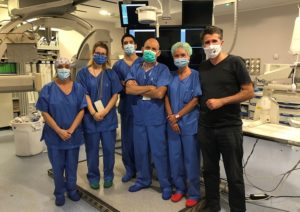
Royal Philips has announced that the first patient has been enrolled in the WE-TRUST (Workflow optimisation to reduce time to endovascular reperfusion for ultra-fast stroke treatment) study at Vall d’Hebron University Hospital in Barcelona, Spain, marking the official start of this multicentre randomised controlled trial (RCT) to assess if the company’s Direct to Angio Suite workflow approach can improve patient outcomes less than six hours after stroke onset.
The WE-TRUST trial will study the clinical impact of the Direct to Angio Suite approach, enabled by a special scan in the angiosuite developed by Philips. This approach combines stroke diagnosis and subsequent treatment in the same angiosuite, which the study will compare to the conventional workflow of diagnosing patients for treatment in the computed tomography (CT) or magnetic resonance imaging (MRI) suite, and then treating them in a separate angiosuite.
“After suffering a stroke, fast time to treatment is paramount to giving patients the best possible outcomes,” said Raul Nogueira, director, Neuroendovascular Service Marcus Stroke and Neuroscience Center at Grady Health in Atlanta, USA, and WE-TRUST principal investigator. “What we will learn about improving time to treatment in the WE-TRUST trial has the potential to significantly improve how acute stroke patients are diagnosed and treated. With the help of an advanced brain scan technology in the angiosuite, for example, we intend to eliminate the need for conventional CT or MRI scans for stroke triage in select patients to save valuable time.”
The multicentre, prospective, open-label, blinded-endpoint WE-TRUST RCT is intended to take place at 15 leading stroke sites, and aims to enrol more than 560 patients across the USA, Brazil, Argentina, The Netherlands, France, Germany, Spain and Turkey. WE-TRUST will be the first global multicentre RCT to assess the impact of the Direct to Angio Suite approach.
The trial will primarily be carried out on Philips’ image-guided therapy system, Azurion—the company’s leading technology for interventional procedures. The primary endpoint of the WE-TRUST trial is clinical outcome measured by the patients’ functional status on the modified Rankin Scale (mRS) three months after the procedure. The trial is anticipated to be completed by 2023.
The Direct to Angio Suite workflow approach can potentially reduce the time to treatment for early-time window stroke patients for whom “every second counts”, according to a Philips press release. It is enabled by an advanced brain scan in the angiosuite, developed by Philips, that uses improved cone-beam computed tomography (CBCT) to improve image quality and facilitate triage of patients. This investigational device reconstructs the stroke CBCT images using specially designed algorithms and filters to reduce artifacts caused by patient motion, bone beam hardening and metal objects.
“In a single-centre RCT in our centre, the Direct to Angio Suite workflow has shown a significant improvement in clinical outcomes in patients who suffered a stroke,” said Marc Ribó, interventional neurologist at the Vall d’Hebron University Hospital and researcher at the Stroke Research group at the Vall d’Hebron Research Institute (VHIR), and WE-TRUST co-principal investigator. “With the updated stroke CBCT investigational device, we can better facilitate triage of patients through improved image quality.”













